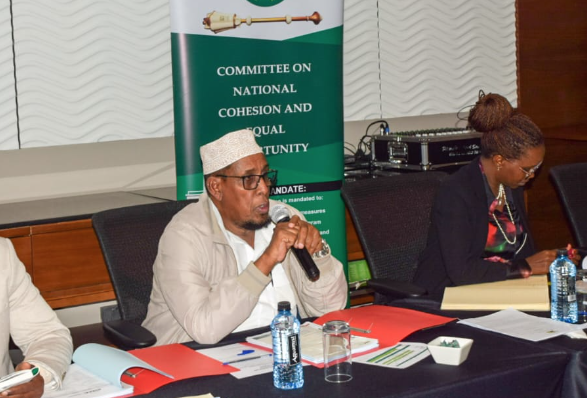 National Assembly Committee on National Cohesion and Equal Opportunity Chairperson Yussuf Adan Haji (Mandera North) speaks during a meeting with officials from KeRRA, KenNHA and GDC/HANDOUT
National Assembly Committee on National Cohesion and Equal Opportunity Chairperson Yussuf Adan Haji (Mandera North) speaks during a meeting with officials from KeRRA, KenNHA and GDC/HANDOUTThe National Assembly Committee on National Cohesion and Equal Opportunity has voiced strong concern over the low representation of persons with disabilities (PWDs) in key State agencies.
Led by Committee Chairperson Yussuf Adan Haji (Mandera North), members expressed disappointment during a session with top officials from four major State corporations.
The meeting was convened to review workforce diversity and inclusion in line with Article 54(2) of the Constitution, which mandates that at least 5 per cent of public sector jobs be allocated to PWDs.
Appearing before the Committee were Kenya Rural Roads Authority (KeRRA) Director General Jackson Magondu, Kenya National Highways Authority (KeNHA) Acting Director General Luka Kimeli, and Geothermal Development Company (GDC) Managing Director Paul Ngugi.
Data presented to the committee revealed that none of the agencies had met the 5 per cent constitutional threshold.
KeNHA posted the highest inclusion rate, employing 11 PWDs out of a total 474 staff (2.3 per cent). GDC followed with 20 out of 904 employees (2 per cent), while KeRRA reported only 9 PWDs among 690 staff members (1.3 per cent).
“It is very sad that PWDs are still excluded from employment in key State agencies despite the Constitution clearly stipulating that 5 per cent of positions be set aside for them,” said Haji.
“State bodies should lead by example. The Committee will not take it kindly if the marginalisation continues.”
Committee members demanded explanations from the agency heads, pressing them on the barriers preventing compliance with the law.
In response, the officials cited several challenges, including a low number of qualified applicants with disabilities, limited recent recruitment exercises, and high numbers of seconded staff from parent ministries.
Despite the shortcomings, the agencies maintained that they had implemented policies to encourage applications from PWDs and remained committed to increasing inclusivity in future recruitment.
They also proposed that Parliament consider introducing legislation to enforce fixed quotas for PWDs in public hiring processes.
The committee also used the session to assess the ethnic diversity of staff within the agencies and their adherence to the 30 per cent procurement reservation for special interest groups, including youth, women, and PWDs.











